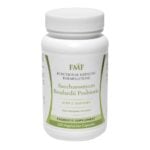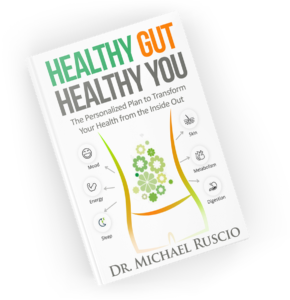Healthy Gut, Healthy You Protocol Produces Results Where Numerous Diet Books and Functional Doctors Fail
Ryan had been suffering with digestive upset (gas, bloat, loose stools…), fatigue, anxiety and depression. He turned to numerous diet books, with no results. He even saw a functional medicine doctor who could not help him. Fortunately, Ryan is now symptom free and feeling great. How? The protocol from Healthy Gut, Healthy You!
Dr. Michael Ruscio, DC: Hey everyone, this is Dr. Ruscio. Today, I’m here with Ryan Cornet, who has read Healthy Gut, Healthy You and had some good results from going through the book protocol. Ryan, thanks for being here today and sharing your story.
[Continue reading below]
Ryan – 28 yr old male
- Chief Complaints – Gas, bloating, constipation, indigestion, moodiness after meals, anxiety, depression, insomnia, and weight loss
- Tried many different diets and protocols for 10 years trying to address gut health issues
Found the Healthy Gut, Healthy You book to be supremely helpful in finally becoming symptom free and “gaining his power back”. Even when he becomes symptomatic again, he would revisit the protocol in the book and find his way back to feeling better more quickly.
Download this Episode (right click link and ‘Save As’)
Ryan Cornett: Absolutely. Thank you for having me on.
DrMR: Can you tell people a little bit about, before you read the book, had you done paleo? Never heard of paleo? Had you tried five different diets? Or probiotics? Tell people kind of the context of before you jumped into the book.
RC: Yeah. Honestly I’ve been kind of going at this diet thing for almost a decade now. I jumped into nutrition, and I felt like I did myself more harm than good. I tried all the crazy diets, growing up in a health food store, working there, which eventually led me to a raw vegan diet. And my stomach was just not happy with that. I couldn’t digest the food. I ended up moving the Hawaii, and I was living on a farm. And the only thing that would make my stomach feel better at that time was incorporating some raw dairy, local eggs, starting to do some meat and nurturing nutrients at that point.
So I started to incorporate more protein into my diet, more animal foods, and I started to feel better. But I just still had this kind of lackluster digestion. I was still trying to figure that out. At that point, I went on the diet fad craze. I tried every diet, every book. You name it, I’ve tried it. I’ve been there. I’ve been an extremist, a zealot. They all made me feel a little bit better, but I still had that residual kind of gas, bloating, indigestion, moodiness after big meals.
At that point, I actually went in and did some testing. I did a stool test, GI map, and I came back with Giardia, actually. And the physician that I was working with, he thought it could be from the water I drank being in Hawaii. I lived in Costa Rica as well. I kind of dove in with several different protocols on my own. Started working with a physician. He helped me a little bit, as well.
But the thing I really loved about your book, Dr. Ruscio, is that it’s a very level-headed approach that you took towards this whole gut/microbiome. You really made me feel human again with your book, to be honest. Because I went through so many protocols. I’ve been doing every diet, every guru, every podcast I could ever listen to forever. Your book was the first condensed format that put it into a simple step, the great in 8 plan. And it really allowed you to work through it. But not only to work through it, but to say, hey, listen, if you’re not better at say step 3 or 4, take a step back and reassess what’s working and what’s not working.
There are two quotes from your book, I don’t know if I’ll say them perfectly. But these literally changed my life. Not just from the physical standpoint, but from a psychological standpoint how I addressed these protocols. There are a lot of quotes that are coming up, actually.
Number one, you said, “Stop throwing a dietary fix at a non-dietary issue,” something to that extent. And that really resonated with me. Because I kept bouncing from the gluten free diet, or the low carb diet, the high carb diet, the no fruit diet, whatever it was. And I was kind of getting the same results with all of them. And I love the fact that you said, “Hey, listen. If you’ve tried all the diets and you’re not really seeing an exponential jump, maybe it’s time to try a different approach, and maybe some of these antimicrobials and some of the therapies that you discuss in your book.” So that was really powerful.
Another thing you said in the book that helped me a lot was, “Eating to reduce inflammation instead of eating to feed gut bugs.” So that helped me a lot because I started to think about, maybe a high fiber diet is not what’s best for me at this point in time. Maybe cutting back on these prebiotics and these high-fiber foods, I can implement other nutrient dense foods to cover those bases. But not feed the gut bugs and the overgrowths that I’m currently working with. So that was really powerful.
Another thing you said in the book was something to the extent of, “You don’t have to be 100% perfect on these diets.”
DrMR: That’s a key one.
RC: Yes. And that was literally like a psychological backpack I took off my shoulders. Because I was, it literally got to one point where I took every single diet and combined it. I was doing a low-FODMAP, paleo, low histamine. Anything you could name. I started to basically stack it up. And it got to the point where the only thing that was left on my list was meat and leafy greens. And at that point, I’m like, what am I doing here? How much exponential benefit am I really getting from this?
I promise you, I read that quote from your book. To hear it from someone that’s as well educated in research and has as much clinical experience as you, for some reason, that gave me a psychological leeway to start to say, hey, maybe I’m going to eat these homemade chips with guacamole. I’m eating a little gluten, and maybe a little bit of FODMAP. But I’ll take extra digestive enzymes. And I’ll cut back and not overdo it. I’ll just have a few of those and see how I feel. Just having that psychological leeway for me, I felt like I turned a page with that.
DrMR: There’s so much great stuff there, I don’t even know where to begin. I’m going to try to address some of those things. But what you’re saying is something that I have seen so much, which is why I wrote these things into the tapestry of the book. One being not trying to force a dietary solution to a non-dietary problem. And also to have a healthy psychology around this, not pigeonhole you into this progressively restrictive dietary approach. And not make you think you’re going to do irrevocable harm to yourself if you eat off plan. Because that does damage people. I do see that in the clinic. And it’s great seeing even when that’s not delivered in the face to face clinical setting. It still carries the amount of weight that it carried before.
And then also, you can have worked with a physician, and having previously treated your lab results, and this book can still do better than that. And I don’t mean to denigrate any doctors out there, but there are some doctors who are very well intentioned. But if you just treat lab results, if you’re working with a doctor who is treating your lab results compared with working with this book, which really listens to your responses and evolves a protocol to fit your needs, ironically the book will be more personalized than a person to person interaction with a clinician in many cases.
RC: Yes. I also like that you have it segmented by steps. Because the last time I worked through the Great-In-8 plan, that was probably four or five months ago. And I just went on vacation, I got back. My stomach has been a little more sluggish. So I’ve actually been going back to the Great-In-8 plan. And I’ve been working through the protocol again. And I felt like this time when I approached it, I had a completely different mindset towards it.
Instead of me being as rigorous and being a zealot about doing every single thing at the exact time. Now I feel like, hey, I know how this plan works for me. Maybe this aspect of the plan works, this aspect doesn’t. So I’m able to implement the steps that really get me back to that place of good digestion. And then I work my way off of it.

DrMR: And I’m glad you say essentially that you felt empowered by the protocol, which is exactly, and I address this in the book, of course, which is looking at this protocol as a way to learn what works for you. And then as part of the end of the protocol, I say, now that we’ve gone through this in a step-by-step sequence, and you’ve learned what aspects really help you, and what ones didn’t really provide that much relief. Now when you regress, you can go back to the tools that were helpful for you, just like you have.
And you don’t feel like you’re not participating in your health care, and you’re not empowered, and it’s just like, well, I’ve got to go back to the doctor now, this magical person who knows all this stuff that I don’t and they’ll tell me what to do. You’re involved in the process, and you understand now what works for your body. So just like you said, you feel empowered. You’re able to go back. Select a few things out from the protocol that worked well for you. And I’m assuming get yourself back to 100% much easier the second time with a few little touch-ups, rather than when you first went through the protocol and you were learning this all for the first time.
RC: Yes.
DrMR: Tell us a little bit about some of the symptoms that you were struggling with first. How did they respond, and how are you feeling now?
RC: So, I’m 28 years old. I’ve been relatively healthy my entire life. I started chasing all these guru diets, and that’s when my digestion started to kind of tank in my early 20s. And then at that point, I felt like I’ve been trying to figure out my digestion, like I said, for almost 10 years.
Last year, I was in Costa Rica, and I was teaching English over there. I drank a lot of questionable water, just kind of traveling throughout Central America. Symptoms started popping up that I had never experienced before in my life. And actually, the first two that really told me something was wrong was anxiety and depression, and insomnia. And I had never experienced those before in my life. I’m generally optimistic, upbeat.
DrMR: And before you had any gut symptoms?
RC: No, the gut symptoms came along with that. My digestion started kind of, like I said, it was always hit or miss. But it started getting just gassy, bloated, backed up, inconsistent with bowel movements. And at that point, I noticed the symptoms correlated with my indigestion. The symptoms got worse. It got to the point where I had to fly home from Costa Rica to go see a western doctor, because I was just down and out. I was losing weight. I was, like I said, anxious. I had just overall…
DrMR: Yeah. Just a quick, I want to echo that for people. Because the gut symptoms are pretty apparent to most people. Gas, bloating, abdominal pain, constipation, diarrhea. And more people are becoming privy to, but it’s worth just expounding upon the fact that those symptoms can directly correlate with insomnia, fatigue, depression, and anxiety. So, if you’re going on the internet and reading about serotonin and depression and SAM-E, and caffeine. Ok, maybe there’s a time and a place. But don’t overlook the foundational piece of your gut health if you’re trying to improve your brain health.
RC: Yeah.
DrMR: So, you’re grappling with these symptoms. What happens next? Then you pick up a copy of the book and you start going through the protocol?
RC: Yeah, I basically hit the internet. I’ve always been passionate about nutrition. But I hit the internet like a madman. I read every book. I read a lot of books. And I listened to every podcast. Every YouTube video. Everyone I could. A lot of people spoke highly of your work, so I actually was waiting for your book.
So I worked through a couple of other protocols prior to your book coming out. And I felt like I was willy nilly. I was all over the place. Everything I heard on a podcast, I would throw it at my stomach. There was no consolidated plan. So when I got your book…
DrMR: It was like from schtick to schtick to schtick.
RC: Exactly. With one, it was all biofilms. With the next one it was digestive enzymes. But no one really put everything together into a step-by-step plan to say, hey, listen. If you’re good at step 3, stay here for a while and see how you feel. It was kind of like, throw everything at a dartboard, see what sticks, and you have no idea which one worked.
DrMR: And, having also the appropriate sequence. Because there are some things that should be done before other things and that can be one of the problems when people experiment haphazardly. It’s not necessarily that my book contains any magical supplement that no one else has. It’s the process. It’s codifying these into the appropriate sequence so as to allow healing. And that’s one of the quotes in the book, also, which is, there’s no magic product. But there is a very helpful process. And I think that’s kind of what you learned.
And you didn’t even just use the gurus. You also went to a doctor. What happen with the doctor? Did he use some kind of antibiotic or antiparasitic agent?
RC: He was great. I kind of ran out of funds, honestly. I did a lot of testing. I did adrenal panel. I did thyroid panel. I did neurotransmitters. I did all different panels and I kind of ran out of financial stability at that point. It got to the point where I just couldn’t do it anymore. So I came across your book. And the book was kind of the user’s guide to implement these things. You laid it out with metanalyses. So I said, you know what? Let’s give it a shot. And that’s when I started working through it.
DrMR: Another good point you make is, sometimes people thing you need testing in order to get healthy. And another concept I address head on in the book, which is, yes, there can be a time and a place for testing. But what a great example you are where you had all this testing, yet you didn’t really treat any of those results. What you did was a logical, algorithmic protocol. And that’s what got you well, absent of needing any testing to steer that process.
I think that’s really worth emphasizing for people who are thinking, I’m feeling unwell. I’ll do anything. We need this data. We need this testing. I’ll spend all the money I need to. But you don’t necessarily have to, right? I get that people will spend the money. But for the cost of maybe 3 tests, you could probably do most, if not all, of this protocol?
RC: Yeah.
DrMR: So that’s an awesome, awesome point. Anything else you think is really important to…


And I sit there thinking to myself, is there something wrong with me? His protocol says you have to do this. But then I read through the book, and it says, no. If this doesn’t work for you, then skip that step.
DrMR: Another quote from the book. “One of the most powerful things you can do to improve your health is learning to listening to your body.”
RC: And literally, it sounds terrible, but I’ve chased so many guru diets that I felt like this was one of the first books that gave me my power back. Honestly.
DrMR: Well said. Well I think that’s the quote of the interview right there. I’ve really wanted to write the book to give people their power back and not make you feel dependent upon supplements or protocols or diets. So that makes me feel awesome. And I can’t thank you enough for taking the time to share your story. In close, anything you want to leave people with?
RC: Like I said. I’ve never spoken with Dr. Ruscio in my entire life. I’ve got no affiliation here. I have spent so much of my 20s sitting in my room reading books, watching YouTube videos, listening to podcasts, trying to be my own doctor. I’ve tried pretty much every guru diet, doctor protocol that’s out there. This is a great protocol, guys, if you want something that’s effective. It’s got a step-by-step guide. It’s honest. It’s based in science and metanalyses and peer-reviewed literature. This is a great protocol, and for the price of a book, you can try it out before you go to see a functional medicine doctor and spend an arm and a leg just to get the results back that tell you to work through this protocol.
DrMR: Well, I couldn’t have said it better myself. I’m so happy that you’re feeling better. I’ve been on the other side of feeling well and feeling ill, and I know how much it sucks to feel ill and how great it feels to feel well. So congratulations to you. I’m super happy for you. Thank you again for sharing your story.
What do you think? I would like to hear your thoughts or experience with this.
- Get help with gut health.
- Get your personalized plan for optimizing your gut health with my new book.
- Healthcare providers looking to sharpen their clinical skills, check out the Future of Functional Medicine Review Clinical Newsletter.





Discussion
I care about answering your questions and sharing my knowledge with you. Leave a comment or connect with me on social media asking any health question you may have and I just might incorporate it into our next listener questions podcast episode just for you!